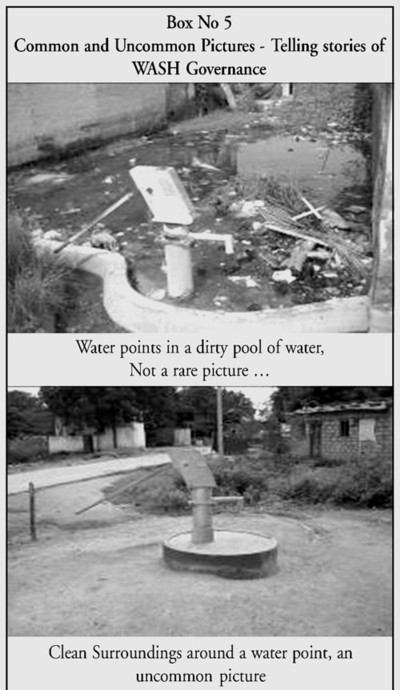/topics/biological-pollution
Biological Pollution
Physicochemical assessment of water quality with respect to remote sensing and GIS techniques - Paper published in the journal Advances in Pure and Applied Chemistry
Posted on 30 Apr, 2012 12:43 PMThe paper informs that current techniques normally used in the country for monitoring and assessment of the quality of water bodies involve in situ measurement and/or the collection of water samples for subsequent laboratory analysis of the chemical, physical and biological characteristics of water.
Depleting water resources in Thalassery, Kerala: Huge effort is required to address water supply and sewerage handling issues
Posted on 22 Apr, 2012 02:57 PMAuthor : Fazal Maliyakkal
A framework for rural drinking water quality management, based on experiences from the voluntary sector - A learning document by Arghyam
Posted on 20 Apr, 2012 04:33 PMThe phases that have been identified for a sustainable WQM programme are:
(1) Assessment of baseline situation
(2) Participatory planning
(3) Water quality monitoring
(4) Implementation
People of Nuapada district in Odisha build a stop dam themselves - Roundup of audio updates from CGNet Swara (Sep 2011 to Feb 2012)
Posted on 03 Apr, 2012 02:57 PMPeople get together to build a stop dam themselves
The people of Khariar road town in Odisha have long requested a check dam across the river Jonk. Khuturam Sunani describes how they have now begun constructing it through shramadaan.
Quantitative data on water quality: A compilation of papers that present physico-chemical analyses of various water sources in India
Posted on 24 Feb, 2012 08:31 AMAssessment of physico-chemical quality of groundwater in rural area nearby Sagar city, Madhya Pradesh
This paper presents the results of forty groundwater samples collected from June 2007 to July 2010 in Gambhira and Baheria villages in Madhya Pradesh. The authors conclude that the ground water quality is degraded due to anthropogenic causes.
How valuable are environmental health interventions? - Evaluation of water and sanitation programmes in India - Paper published in the Bulletin of the World Health Organisation
Posted on 21 Feb, 2012 06:11 PMThe paper informs that a number of epidemiological studies on the benefits of water and sanitation interventions have shown that diarrhoea can be reduced by 30–50%.
An ecological quantification of the relationships between water, sanitation and infant, child, and maternal mortality - Paper published in the Journal Environmental Health
Posted on 21 Feb, 2012 03:30 PMA number of studies have made associations between prevention of disease burden among populations by improving water supply, sanitation, hygiene and management of water resources and between poor water quality and disease burden.
Impacts of climate change on public health in India - Future research directions - Paper published in Environmental Health Perspectives
Posted on 19 Feb, 2012 11:00 PMThis paper published in the journal Environmental Health Perspectives reviews the current state of the science relevant to the 2009 Joint Indo–U.S. Workshop on Climate Change and Health that was held in Goa, India, and, then discusses the observed relationships between climate variability and human health specifically in relation to the Indian subcontinent, highlighting future research directions.
The paper briefly summarises relevant literature on the impacts of climate change in India and touches upon the opportunities and significant challenges associated with designing, initiating, and conducting research, as well as pursuing related public health programming to improve public health infrastructure in the face of climate change. The paper argues that such research is needed to pave the way for unique and pioneering solutions that can improve public health in the face of increasing climate variability.
Understanding governance in WASH sector in Andhra Pradesh - A study by WASSAN
Posted on 18 Feb, 2012 03:38 PMProblems in the water, sanitation and hygiene (WASH) sector have their roots in socio-political issues rather than in technology. This paper presents the report of a survey in 107 villages in rural Andhra Pradesh to illustrate the influence of governance systems.

Stress of urban pollution on largest natural wetland ecosystem in East Kolkata - Causes, consequences and improvement
Posted on 14 Feb, 2012 10:23 AMThe impact of sewage pollution on these fish ponds and on the ecosystem is evaluated. Similarly, remedial measures to maintain water quality and to improve resource recovery efficiency are suggested.





